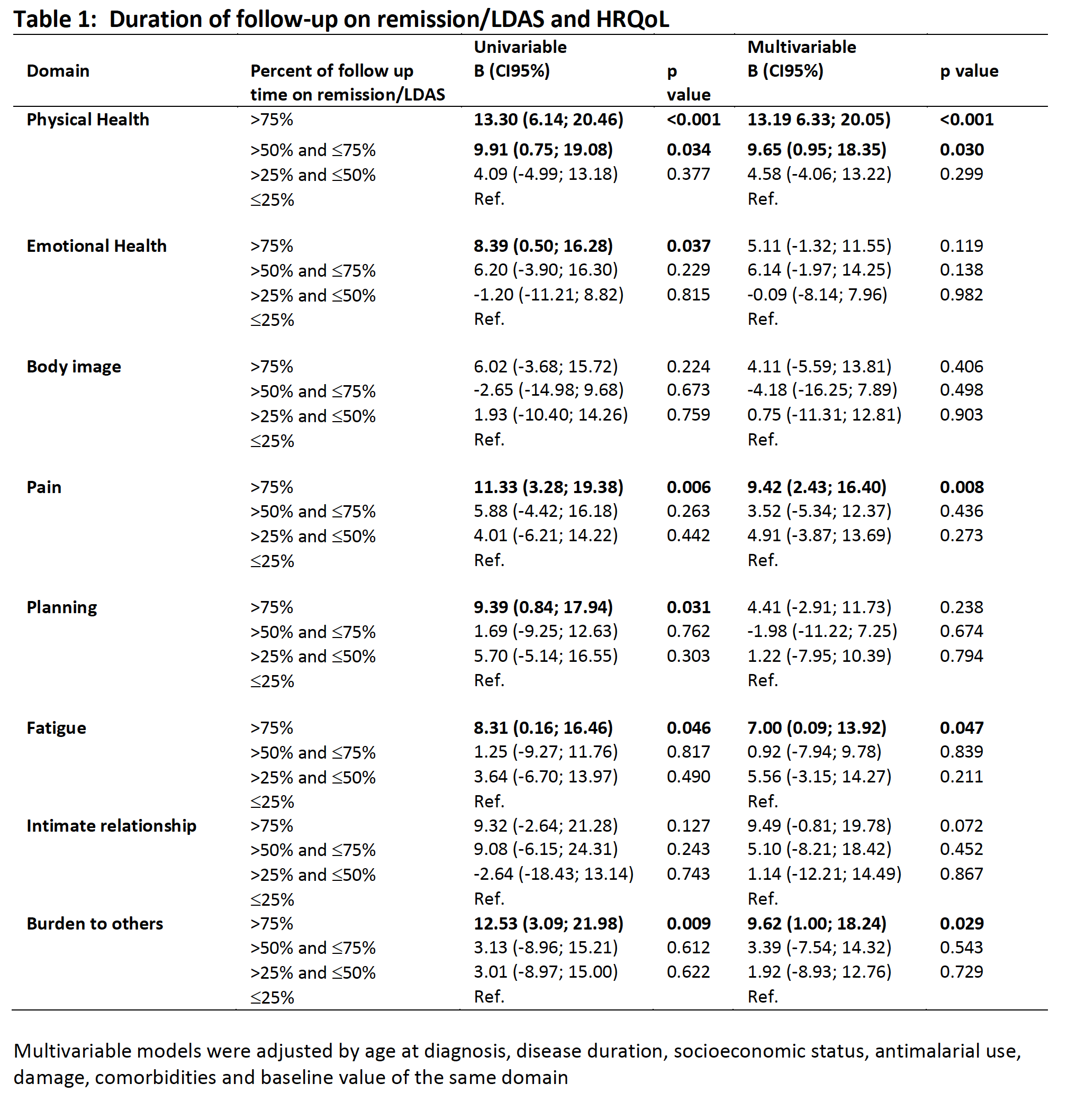Session Information
Date: Monday, October 22, 2018
Title: Systemic Lupus Erythematosus – Clinical Poster II: Biomarkers and Outcomes
Session Type: ACR Poster Session B
Session Time: 9:00AM-11:00AM
Background/Purpose: Achieving remission and low lupus disease activity state (LDAS) in systemic lupus erythematosus (SLE) patients improves their prognosis in terms of damage accrual. But, the impact of these states on health-related quality of life (HRQoL) has only been sparsely assessed (1, 2). The aim of these analyses is to evaluate the association between the duration of remission and LDAS and HRQoL, after adjustment for possible confounders.
Methods: Patients from a single center cohort started in 2012 and who had at least two visits were included in this study. Visits were performed every six months. Socioeconomic and clinical data were recorded at every visit. Disease activity was ascertained with the Systemic Lupus Erythematosus Disease Activity Index 2000 (SLEDAI-2K), disease damage with the SLICC/ACR Damage Index (SDI) and HRQoL with the Spanish version of the LupusQoL. Remission was defined as a SLEDAI-2K=0, prednisone<=5mg/d, immunosuppressants on maintenance dose, LDAS was defined as not on remission and a SLEDAI-2K<=4, prednisone<=7.5mg/d, immunosuppressants on maintenance dose. Disease activity states were recorded in each visit. The outcomes were each of the LupusQoL’s domains at the last visit. Univariable and multivariable lineal regression models, adjusted by age at diagnosis, disease duration, socioeconomic status, antimalarial use, damage, comorbidities and baseline value of the same domain were performed. Duration of remission/LDAS was categorized as <=25%; >25 but <=50%; >50 but <=75%; and >75. Due to the relatively small number of patients on remission, remission and LDAS were examined together.
Results: Two hundred and thirty-five patients were included, 217 (92.3%) were female, mean (SD) age at diagnosis was 35.42 (13.30) years. Disease duration at baseline was 7.32 (6.69) years. The mean follow-up was 3.29 (1.27) years, and they had 4.93 (1.99) visits. Mean percentages of visits on each state during the follow up were 24.23 (31.38) for remission 32.16 (32.63) for LDAS and 43.60 (38.71) for active. The association between the percentage of follow-up on remission/LDAS is depicted in Table 1.
Conclusion: A longer duration on remission/LDAS is associated with a better HRQoL (Physical Health, Pain, Fatigue and Burden to Others) independently of possible confounders.
1. Mok CC, Ho LY, Tse SM, Chan KL. Prevalence of remission and its effect on damage and quality of life in Chinese patients with systemic lupus erythematosus. Ann Rheum Dis. 2017;76(8):1420-5.
2. Golder V, Kandane-Rathnayake R, Hoi AY, Huq M, Louthrenoo W, An Y, et al. Association of the lupus low disease activity state (LLDAS) with health-related quality of life in a multinational prospective study. Arthritis Res Ther. 2017;19(1):62.
To cite this abstract in AMA style:
Ugarte-Gil M, Gamboa-Cárdenas R, Medina-Chinchon M, Reategui-Sokolova C, Zevallos F, Elera-Fitzcarrald C, Pimentel-Quiroz VR, Noriega E, Rodriguez-Bellido Z, Pastor-Asurza CA, Alarcón GS, Perich-Campos R. Prolonged Remission/Low Disease Activity State Is Associated with a Better Health-Related Quality [abstract]. Arthritis Rheumatol. 2018; 70 (suppl 9). https://acrabstracts.org/abstract/prolonged-remission-low-disease-activity-state-is-associated-with-a-better-health-related-quality/. Accessed .« Back to 2018 ACR/ARHP Annual Meeting
ACR Meeting Abstracts - https://acrabstracts.org/abstract/prolonged-remission-low-disease-activity-state-is-associated-with-a-better-health-related-quality/

